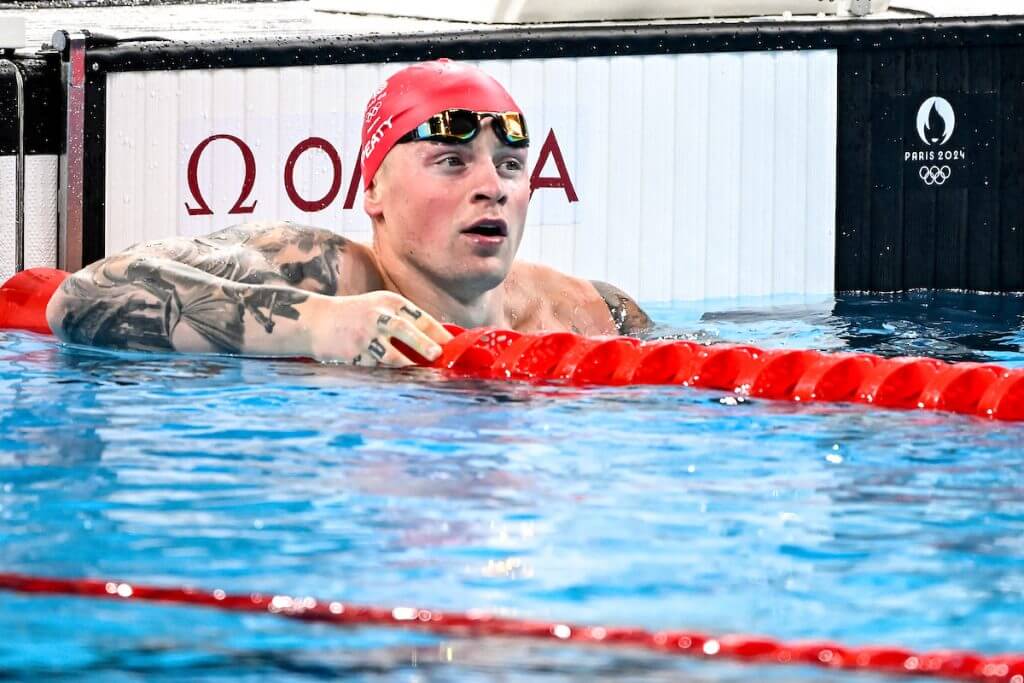Paris Olympics: What Normalcy? COVID Returned to Games with More Bumps

Paris Olympics: What Normalcy? COVID Returned to Games to Provide More Bumps
Paris was supposed to be the return to normalcy, the first Olympics after the calendar-shifting, norm-busting COVID-19 pandemic.
Selling it as a post-COVID Games would’ve rung hollow for Adam Peaty and
for most of the week, two of several swimmers testing positive for the respiratory virus at the Paris Olympics.
Instead of a Games where COVID-19 was a little noticed background facet, the virus took center stage as it lodged itself in the lungs of several top competitors. It was an unexpected topic in media conversations with swimmers, and while eyes were trained on the microbial effects of the marathon swims in the River Seine, the Paris La Defense Arena proved a suitably intriguing petri dish in itself.
Peaty was the highest profile victim. Chasing his third straight title in the men’s 100 breaststroke, he tested positive just after clinching a silver medal in the event. Whether or not the infection could’ve made the difference in the water on July 28, Peaty .02 behind the win by Italian Nicolo Martinenghi and tied with American Nic Fink, it certainly hampered the rest of the 29-year-old’s week.
Peaty was out of the water for two days, returning July 31. He didn’t swim on Great Britain’s mixed medley relay on Aug. 2 and Aug. 3, the squad falling short of defending its Tokyo crown with a seventh-place result. Peaty was healthy for prelims and finals of the men’s medley, where Britain finished fourth, 1.22 seconds behind the French bronze medalists. Peaty outsplit Leon Marchand by nearly a half-second on the breaststroke leg, even if he wasn’t feeling fully fit.
Despite relative success, his battle with COVID and an ear infection made it a trying week.
“Probably the worst week of my life in terms of how my body feels, and that’s no exaggeration,” Peaty said. “Everything’s come at once since the COVID. It’s just every day waking up with a different thing. The medical team has been brilliant. It’s just a victory getting on that starting block.”
Peaty wasn’t alone. Australian distance ace Lani Pallister tested positive on July 29, costing her a chance to swim in the 1500 free. The 22-year-old recuperated in time for her two big events, including a leg on the finals squad of the 800 free relay that won gold.
Pallister also got to swim her best event, the 800, in which she finished sixth. But during two days of isolation, doing a job for her mates in the relay was top of mind.
“I think the forefront of the mind was the 4×2,” Pallister said. “I kind of just parked the 800 for a bit anyway because to be in the Australian 4×2 is probably one of the hardest teams to make in the world. You’ve got the world No. 1 (in the 200 free), world No. 2 and the two of us that ended up being in the final, we would have made the final here. I think that was the first step, and then when Dean (Boxall, Australian coach) told me yesterday morning, I cried again. Then I just had a job to do.”
COVID hung in the periphery for many other swimmers, with sporadic and unconfirmed reports of swimmers taking ill. The World Health Organization, per the New York Times, reported at least 40 positive tests for COVID-19 among athletes at the Games. (Among those going public was a diagnosis was Australia Zac Stubblety-Cook, the silver medalist in the men’s 200 breast.) With none of Tokyo’s requirements of daily testing and social distancing, and a more vaccinated population that reduced the risk of acute illness, teams were under no requirement to disclose positives. Most delegations enacted different protocols for distancing, training and competing after a positive test, and many didn’t differentiate the prescription for COVID-19 from other respiratory illnesses.
Instead, COVID became one of many uncontrollable factors for swimmers and coaches to navigate.
“I think everyone says the Olympics is a roller coaster,” Pallister said. “Mine has been probably the biggest roller coaster in the world. I don’t think anybody can really anticipate getting COVID, pulling out of your first-ever individual event at the Olympics. I definitely had to compartmentalize it.”

- EVENT PAGE
- SCHEDULE
- VENUE
- STREAMING INFO
- DAY 1 PRELIMS RESULTS
- DAY 1 FINALS RESULTS
- DAY 2 PRELIMS RESULTS
- DAY 2 FINALS RESULTS
- DAY 3 PRELIMS RESULTS
- DAY 3 FINALS RESULTS
- DAY 4 PRELIMS RESULTS
- DAY 4 FINALS RESULTS
- DAY 5 PRELIMS RESULTS
- DAY 5 FINALS RESULTS
- DAY 6 PRELIMS RESULTS
- DAY 6 FINALS RESULTS
- DAY 7 PRELIMS RESULTS
- DAY 7 FINALS RESULTS
- DAY 8 PRELIMS RESULTS
- DAY 8 FINALS RESULTS
- DAY 9 FINALS RESULTS



